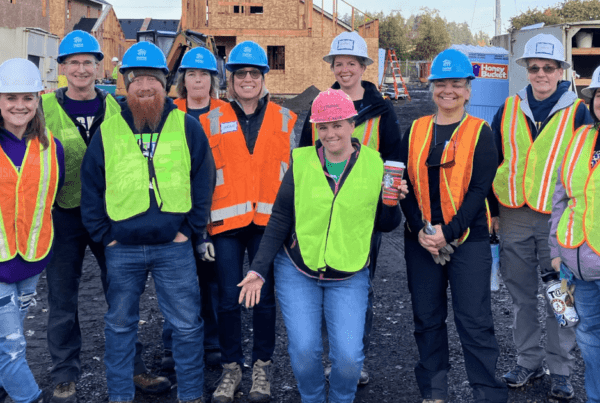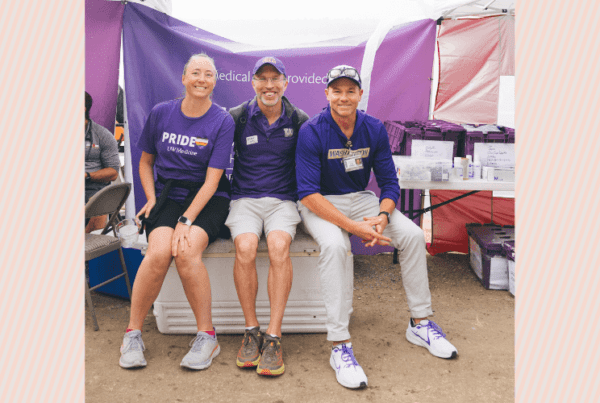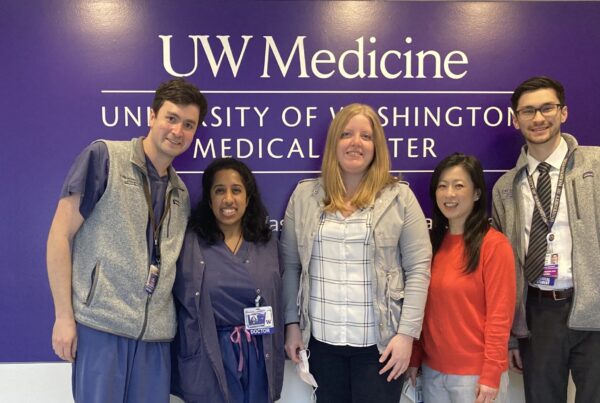Dear UW Medicine Faculty, Trainees and Students,
My family, friends and colleagues have been struggling over the weight of witnessing and addressing the constant racism that impacts us daily, from microaggressions and macroaggressions to overt racists interactions. I’d like to share a few stories with you to shed light on how personal this is to me and so many that share my Blackness.
I vividly remember being a young child, sitting in the backseat of my father’s car driving home but having to drive through a predominantly white neighborhood. We were pulled over by police, red and blue lights flashing and reflecting off the side-view mirror and onto my face. The officer demanded my father to exit the vehicle, handling him like he was his dog. They undoubtedly profiled us and eventually searched the car, ransacking the entire car, pulling every paper, napkin, and spare coin out of its place just for fun. I cried in fear and terror in the backseat, thinking of what they had done to others who looked like my dad. They handcuffed him, took him to the police station and forced him to stay there, while I had to wait in the street for my mother to pick me up. They released him two days later without a charge or valid reason for arresting him. To be clear my father never committed a crime in his life, and the pain and fear I felt for the days he sat in the jail never leaves my mind. I knew there was a possibility that I would never see him again. This is police terror, but it doesn’t end there.
When I left California for college, I remember driving into New Orleans city limits and passing a confederate flag displayed proudly on the roof of a home. Or when my cousin, when acclimating me to my new home in Louisiana, warned me to not drive to St. Jefferson Parish after dark — a predominantly white neighborhood — for I may not come back.
More recently, a terrifying incident occurred at the car wash my father owns in Oakland, CA, where he employs young black men and it acts as a job training program for adults with developmental disabilities. My nephew, my father’s grandson works at the car wash. Just last year, police descended upon the car wash, surrounding it and detaining my nephew in handcuffs claiming he “fit a description” of a person who committed a crime in the area. After holding him in cuffs for hours, they finally released him and left the premises. These are just a few of the things I have witnessed in my life — one person. And let’s not mention all the acts of racism that I’ve endured that I’ve forgotten because they occurred too many times. These stories are not isolated, and the terror that exists in the Black community, that we have come to expect from over-policing our communities, is the reason for my drive to effect change in the world around me. I no longer ask for progress, I demand change.
Black individuals in the United States have endured events in our everyday life without an audience or validation of our experiences. Now, these incidents have become displayed vividly across our cellphones, computer screens, and televisions. The experiences that have historically been dismissed by the White majority as overreactions have now been documented and we have the receipts. To be Black in this country is to be a second-class citizen. No matter the education, income level, or location, my skin color dictates my experience. And we cannot take it anymore. The loss of life at the hands of police presents a public health emergency that requires decisive and concrete action.
We have simple demands that have been supported by every Dean within the UW Health Sciences in the letter they recently signed:
Mayor Durkan, County Executive Constantine, and Governor Inslee: You must declare Racism and Police Violence as a Public Health Issue. To do so, you must:
- Immediately end the violence against protesters. We stand in solidarity with them!
- Eliminate legislative provisions that shield law enforcement officers from investigation and accountability.
- Provide full public disclosure of all investigations of law enforcement officer brutality and excessive use of force as well as access to recordings of any incidents in question, which should be deemed public property. These materials could be made public through an online database.
- Reverse the militarization of law enforcement, by eliminating acquisition and use of military equipment and reducing the number of SWAT teams and the frequency of their deployment.
- Fund studies that explore the effectiveness of interventions that may decrease reliance on law enforcement, including decriminalization, increased investment in social determinants of health, and community-based alternatives that promote public safety, such as violence intervention and restorative justice.
- Fund programs that meet human needs, promote healthy and strong communities, and reduce structural inequities (economic, racial, and social) — such as employment initiatives, educational opportunities, and affordable housing—including by using resources currently devoted to law enforcement.
- Advance equity and justice by eliminating officer enforcement of regulations designed to oppress marginalized people, including but not limited to substance use and possession, sex work, loitering, sleeping in public, and minor traffic violations as well as targeting undocumented immigrants.
- Engage in a review of law enforcement agencies’ formal and informal policies and practices in order to eliminate disproportionate violence against specific populations. Examples of such policies and practices may include racial and identity profiling, stop and frisk, gang injunctions, and enforcement of laws that criminalize houselessness.
Adapted from the American Public Health Association Policy statement from 2018, Addressing Law Enforcement Violence as a Public Health Issue Policy (https://www.apha.org/policies-and-advocacy/public-health-policy-statements/policy-database/2019/01/29/law-enforcement-violence)
We must show a strong stance as a UW Medicine community and in solidarity with a community that has been brutalized for far too long. Statements are great, action is better. We offer the following as a concrete action and ask all of our colleagues to join us in protest of the racial violence, by marching from Harborview Medical Center to Seattle City Hall on Saturday, June 6 at 10 am. Physicians, residents, fellows and medical students should wear their white coats with honor, distinction, and wield the full strength of our professions to highlight the importance of our leadership and presence during this time.
This march will be peaceful and powerful to show the full strength of Medicine that seeks justice for the most marginalized of our community.
We march for David McAtee, George Floyd, Breonna Taylor, Sandra Bland, Tamir Rice, Trevon Martin, Ahmaud Arbery, Oscar Grant, Philando Castile, Michael Brown, Mario Woods, Walter Scott and so many more who never make a headline and whose stories are deemed unworthy because they are presumed guilty and deserving of death before a jury every hears their story. (See more about the stories who don’t make national headlines at mappingpoliceviolence.org). We hope to galvanize support and partnership from all departments at UW Medicine.
We implore you to join us in the march for justice. The schedule of events will be as follows:
9 am – Meet at Harborview Medical Center
9:30 am – Remarks
10 am – Begin March to City Hall
11 am – Remarks by Edwin Lindo and Estell Williams
11:30 am – Demand Letter emailed to Mayor, King County Executive, and Governor; and City and King County council members
Noon – End
In Solidarity,
Estell J. Williams, MD (she/her/hers)
Assistant Professor, University of Washington, Department of Surgery
Executive Director, Doctor For A Day
Edwin G. Lindo, JD (he/him/his)
Lecturer, Department of Family Medicine
Associate Director, Critical Teaching and Equity
CLIME (Center For Leadership And Innovation in Medical Education)


